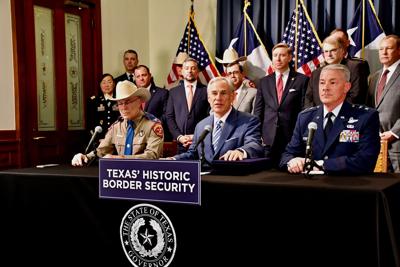AUSTIN — Gov. Greg Abbott signed six bills Thursday that he said will expand border security efforts along the Texas-Mexico border.
Texas continues to funnel resources into its southern border military mission known as Operation Lone Star, which it launched in April 2021. The state has since spent more than $4 billion on the mission, which included deploying thousands of state National Guard soldiers to the border. The state has also laid down miles of concertina wire to discourage illegal crossing.
“Washington, D.C., has failed to do (its) job to secure our borders, as a result Texas has had to take unprecedented steps of responding to the crisis caused by the Biden Administration on the border,” Abbott said. “In response, the Texas Legislature has stepped up to make sure we will be able to more robustly respond.”
The state budget, passed by lawmakers last month, also includes $5.1 billion in border security funding across 13 agencies over the biennium. The 2021 budget included $4.9 billion.
“I’m signing bills that will ensure that Texas will be able to do even more to stop illegal immigrants from crossing into our state,” Abbott said.
The ceremony occurred as lawmakers continued to debate additional border security bills in the first-called special session.
Abbott tasked legislators with passing a bill that increases or enhances the penalties for certain criminal conduct involving the smuggling of persons or the operation of a stash house. The House passed the bill immediately, calling sine die before other border security bills could be addressed. Oppositely, the Senate passed the bill this week, with other related to border security also in the works.
The House would need to return to take up any additional bills before they could be sent to the governor.
The two chambers have roughly two weeks to finalize bills in the current special session before the 30-day clock runs out, at which point Abbott could — and likely will — call additional special sessions.
The following bills were signed Thursday and go into effect on Sept. 1.
- Senate Bill 423 by state Sen. Angela Paxton, R-McKinney, and state Rep. Terry Wilson, R-Georgetown. It authorizes the Texas Military Department to use drones as part of the state’s mission on the southern border. The state agency already has and uses drones for search-and- rescue operations as well as for natural disasters.
- SB 602 by state Sen. Brian Birdwell, R-Granbury, and state Rep. Sam Harless, R-Spring. It gives a border patrol agent who has completed certain training the powers of arrest and search and seizure at ports of entry or at border patrol checkpoints. The training does not currently exist and will be developed by the Department of Public Safety.
- SB 1133 by state Sen. Cesar Blanco, D-El Paso, and state Rep. Tracy King, D-Batesville. The law compensates landowners who suffer property damage on agricultural land as a result of a trespasser who is smuggling people, evading arrest and other related offenses. Landowners can receive up to $75,000 per incident.
- SB 1403 by state Sen. Tan Parker, R-Flower Mound, and state Rep. David Spiller, R-Jacksboro. It gives the governor authority to coordinate and execute an interstate compact for border security among interested states without congressional approval. This will allow participating states to share law enforcement intelligence on illegal activity along the border, equipment, resources and technology.
- SB 1484 by state Sen. Brandon Creighton, R-Conroe, and state Rep. Justin Holland, R-Rockwall. It enhances DPS training for border operations by creating a training program for peace officers employed by local law enforcement agencies. The program includes training on cartel-related activity as well as the best tactics to address border crimes.
- SB 1900 by state Sen. Brian Birdwell, R-Granbury, and state Rep. Ryan Guillen, R-Rio Grande City. It defines and adds foreign terrorist organizations to organized crime offenses under state law, adds higher penalties for criminal activity associated with foreign terrorist organizations and allows local entities to seek public nuisance claims against foreign terrorist organizations.





















Commented
Sorry, there are no recent results for popular commented articles.